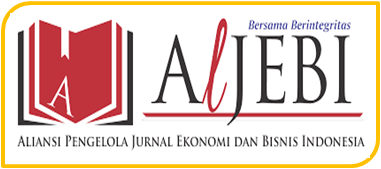How Does Zakat Institutions Contribute to the Business Success of Mustahiq?
Abstract
Keywords
Full Text:
PDFReferences
Al-Mubarak, T. (2016). The Maqasid of Zakah and Awqaf and Their Roles in Inclusive Finance. ICR Journal, 7(2), 217–230.https://doi.org/10.52282/ icr.v7i2.264
Alam, M. M., Hassan, S., & Said, J. (2015). Performance of Islamic microcredit in perspective of Maqasid Al-Shariah: A case study on
Amanah Ikhtiar Malaysia. Humanomics, 31(4), 374–384. https://doi.org/10.1108/H-12-2014-0072
Andriati, R., & Huda, N. (2015). The Influences of Productive Zakah Mentoring To Saving Behavior and The Prosperity of Poor Housewife. Al-Iqtishad: Jurnal Ilmu Ekonomi Syariah, 7(2), 207–216.https://doi.org/10.15408/ aiq.v7i2.1698
Anis, F. M., & Kassim, S. H. (2016). Effectiveness of Zakat-Based Programs on Poverty Alleviation and Economic Empowerment of Poor Women: a Case Study of Bangladesh. Journal of Islamic Monetary Economics and Finance, 1(2), 229–258. https://doi.org/10.21098/jimf.v1i2.539
BAZNAS. (2016). Buku statistik Zakat Nasional 2015. Buku Statistick Zakat Nasional 2015, 1.2, 46.
Bin Mislan Cokro Hadisumarto, W., & Ghafar, A. (2010). Improving the effectiveness of Islamic micro-financing: Learning from BMT experience. Humanomics, 26(1), 65–75. https://doi.org/10.1108/08288661011025002
Chittithaworn, C., Islam, A., Keawchana, T., & Yusuf, D. H. M. (2011). Factors affecting business success of small & medium enterprises (SMEs) in Thailand. Asian Social Science, 7(5), 180–190.https://doi.org/10.5539/ ass.v7n5p180
Faisol, F. (2017). Islamic Bank Financing and It’s Impact on Small Medium Enterprise’s Performance. Etikonomi, 16(1), 13–24.https://doi.org/10. 15408/ etk.v16i1.4404
Fatoki, O. O. (2011). The Impact of Human, Social and Financial Capital on the Performance of Small and Medium-Sized Enterprises (SMEs) in South Africa. Journal of Social Sciences, 29(3), 193–204. https://doi.org/ 10.1080/09718923.2011.11892970
Hassan, N. M., & Noor, A. H. M. (2015). Do Capital Assistance Programs by Zakat Institutions Help the Poor? Procedia Economics and Finance, 31(15), 551–562. https://doi.org/10.1016/s2212-5671(15)01201-0
Hijriah, H. Y. (2016). Spiritualitas Islam dalam Kewirausahaan. Tsaqafah, 12(1), 187–208.https://ejournal.unida.gontor.ac.id/index.php/tsaqafah/article/ view/374/367
Ibrahim, D., & Ruziah Ghazali, D. (2014). Zakah as an Islamic Micro-Financing Mechanism to Productive Zakah Recipients. Asian Economic and Financial Review, 4(1), 117-125., 4(1), 117–125. http://www.pakinsight.com/pdf-files/aefr 4(1), 117-125.pdf
Infid. (2017). Menuju Indonesia yang Lebih Setara: Laporan Ketimpangan Indonesia. In Menuju Indonesia yang Lebih Setara: Laporan Ketimpangan Indonesia.
Jalaludin. (2012). Pengaruh Zakat Infaq Sadaqah Produktif Terhadap Pertumbuhan Usaha Mikro dan Penyerapan Tenaga Kerja Serta Kesejahteraan Mustahik. Majalah Ekonomi, 3.
Mariyanti, T., & Mahfudz, A. A. (2016). Dynamic circular causation model in poverty alleviation: Empirical evidence from Indonesia. Humanomics, 32(3), 275–299. https://doi.org/10.1108/H-02-2016-0016
Muhamat, A. A., Jaafar, N., Emrie Rosly, H., & Abdul Manan, H. (2013). An appraisal on the business success of entrepreneurial asnaf. Journal of Financial Reporting and Accounting, 11(1), 51–63.https://doi.org/10.1108/ jfra-03-2013-0012
Othman, P., Sabri, W., Hussin, W., & Hamdan, H. (2012). Is Microfinance Program in Malaysia Really Effective in Helping the Poor? World Review of Business Research, 2(1), 79–97.
Pannu, M. H. (2017). The impact of knowledge management infrastructure on organizational performance in SMES. International Journal of Human Resource & Industrial Research, 4(2), 26–31. www.arseam.com
Widiyanto, Mutamimah, & Hendar. (2011). Effectiveness of Al Qard Al Hasan Financing As a Poverty Allevation Model. Economic Journal of Emerging Markets, 3(1), 27–42.
Yaacob, Y., & Azmi, I. A. G. (2012). Entrepreneur’s Social Responsibilities From Islamic Perspective: A Study of Muslim Entrepreneurs In Malaysia. Procedia - Social and Behavioral Sciences, 58(1999), 1131–1138.https://doi. org/10.1016/j.sbspro.2012.09.1094
Yumna, A., & Clark, M. (2009). Integrating zakat and Islamic charities with microfinance initiative in the purpose of poverty alleviation in Indonesia. 8th International Conference on Islamic Economics and Finance Integrating, 1–18.
DOI: https://doi.org/10.18860/miec.v2i2.18264
Refbacks
- There are currently no refbacks.

This work is licensed under a Creative Commons Attribution-ShareAlike 4.0 International License.
Editorial Office:
Megawati Soekarnoputri Building
Faculty of Economics
Jln. Gajayana 50 Telp (0341) 558881
E-mail: m-iecjournal@uin-malang.ac.id
UIN Maulana Malik Ibrahim Malang
Member of:
Indexed by:
Maliki Islamic Economics Journal under a CC BY SA 4.0 International License.
View My Stats


























